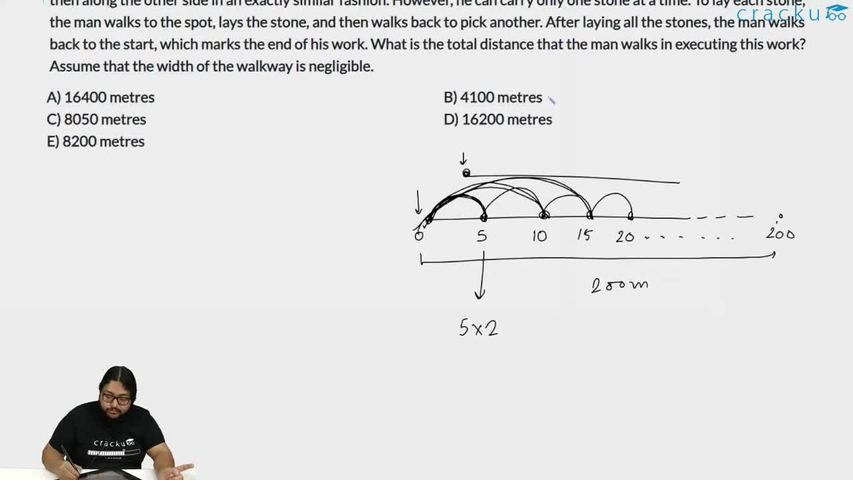A man is laying stones, from start to end, along the two sides of a 200-meterwalkway. The stones are to be laid 5 meters apart from each other. When he begins, all the stones are present at the start of the walkway. He places the first stone on each side at the walkway’s start. For all the other stones, the man lays the stones first along one of the walkway’s sides, then along the other side in an exactly similar fashion. However, he can carry only one stone at a time. To lay each stone, the man walks to the spot, lays the stone, and then walks back to pick another. After laying all the stones, the man walks back to the start, which marks the end of his work. What is the total distance that the man walks in executing this work? Assume that the width of the walkway is negligible.
Solution
The walkway is 200 meters long, and stones are placed 5 meters apart on both sides, starting at 0 meters (the start) and ending at 200 meters (the end). The number of stones per side is calculated as follows: from 0 to 200 meters inclusive, with a stone every 5 meters, there are 200/5+1=41 stones per side (0, 5, 10, ..., 195, 200). Since there are two sides, the total number of stones is 41×2=82. However, the first stone on each side (at 0 meters) is laid without walking, as all stones start at the beginning, so we subtract these two initial placements, leaving 82−2=80 stones requiring trips.
The man lays stones in an identical pattern along one side (Side A) and then along the other (Side B). He carries one stone at a time, walks to the spot, lays it, and then walks back to the start to get the next stone. After laying all the stones, he walks back to the start.
Excluding the first stone at 0 meters (no walking), he lays 40 stones (5, 10, ..., 200 meters).
For each stone: Walk to the spot (distance d).
Walk back to the start (distance d)
Total per trip = 2d.
Distances: 5, 10, 15, ..., 200 meters.
This is an arithmetic series: first term = 5, last term = 200, number of terms = 40
The sum of distances to lay stones = 5+10+...+200
The number of terms being 40, the sum will be 20(205)=4100
Total for Side A (to and back): This multiplied by 2 will be 8200
He repeats the exact process for the other side: 40 stones at 5, 10, ..., 200 meters.
Total distance for Side B = 8200 meters (same calculation).
Thus, the total distance the man walks is 16,400 meters.
Video Solution

Click on the Email ☝️ to Watch the Video Solution